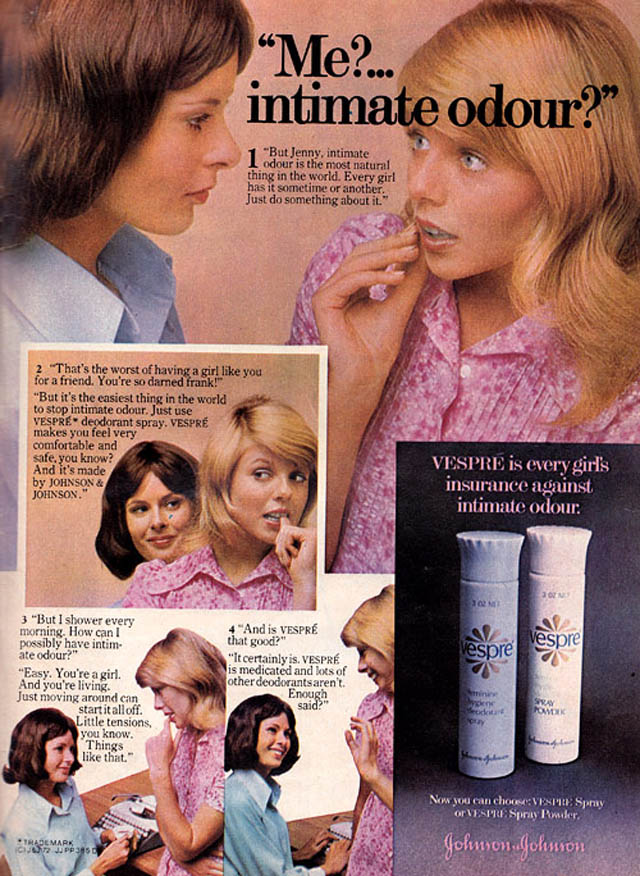October 15 2020 | Written by Madi Hanaka
I still remember the first time I heard someone joke about vaginal odor. I was in middle school, and all of the boys in my class were singing along to “Colt 45” by Afroman. If you’re familiar with this song already, well, my sincerest apologies. However, if you’re not, I’ll spare you the details of the lyrics in their entirety because they’re very graphic and highly offensive. For the sake of this blog, however, I will draw your attention to the interlude of the song. The intro to the first verse goes like this:
.
Wait a minute man
Hey check this out man (Tell it!)
It was this blind man right, it was this blind man right
He was feelin' his way down the street with this stick right?
Hey. He walked past this fish market, you know what I'm sayin' (Fish market?)
He stopped he took a deep breath he said:
"Woooo, good morning, ladies!"
Ha-ha-ha-ha-ha!
.
When I heard this for the first time at 12 or 13, I must admit it took me a while to process what exactly the punchline was and why all of the boys in my class found it so hilarious. When I understood though, all I knew was that I never wanted anyone to say anything like that about me.
Many of us know what it feels like to be insecure about their vaginal odor. For example, a friend of mine once told me that “I don’t even like guys going down on me because I’m nervous that it smells bad and that he’ll think I’m gross”. After having so many of these conversations with females in my life and feeling these insecurities myself, I wondered why on earth this is such a common concern for individuals with vulvas, and where does this fear of smelling dirty, fishy, or gross stem from? In this week's blog post, we’re diving into the world of feminine hygiene products and exploring the effects they have on us, both on our health and confidence.
In the United States alone, the feminine hygiene market makes over 2 billion dollars every year, pushing the message that their products will help us feel clean and fresh. These results are said to be able to be achieved using a variety of different products: douches, sprays, wipes, washes, powders and more. Although these advertisements promise cleanliness, medical research suggests that, ironically, these companies are hiding a very dirty secret: their products don’t work. The vagina is self-cleaning, meaning that additional products are never needed to be used inside for cleaning purposes. Not only do these products not effectively clean the vagina, they can also do more harm than good; According to medical experts, using feminine washes – or similar products – can make you more susceptible to STIs, HIV, bacterial vaginosis, and in some cases increase your risk of developing ovarian cancer.
A valentines-themed ad from Summer’s Eve.
The stigma associated with vaginal scents has a long history of being capitalized on.
Knowing this long list of frightening effects, it’s fair to wonder: why are these products still on the market? And, more importantly, why do up to 40 percent of females use them regularly? The answer to this question is complicated and it relates closely to cultural beliefs about females and their bodies. Feminine hygiene companies aren’t clueless. They are well aware that we have been continuously shamed for their bodies, whether it be related to menstruation, discharge, or other bodily functions. By spreading the message that vaginas are inherently gross, this industry reinforces our insecurities and then simultaneously pushes products in front of us as solutions to our “problems”.
As stated by Sherry Ross, an obstetrician-gynecologist, “your vagina is not meant to smell like a rose garden”. Instead, a few more common descriptions are metallic, sweet, sour, salty etc. What’s considered to be a “normal” smelling vagina is going to be different from person to person, so it’s tricky to come up with a description of how exactly your vagina “should” smell. A better way to look at it, according to Dr. Ross, is to get to know what your normal is, then you will likely be aware if there are sudden changes.
In some cases, vaginal odor can be an indicator of a medical abnormality. For example, gynecologist Jen Gunter states that there can be a variety of causes for vaginal odor such as:
-
bacterial vaginosis
-
trichomoniasis
-
genitourinary syndrome of menopause (GSM)
-
desquamative inflammatory vaginitis (DIV)
-
a retained tampon or foreign object
-
skin conditions like lichen planus or lichen sclerosis
-
Incontinence
(The Vagina Bible, Jen Gunter, pg. 358)
If you believe that you have a persistent odor then it’s good practice to seek a professional medical opinion in order to get a diagnosis. But let’s make one thing clear: your vagina cleans itself - it does not need any help.
It can be difficult to remind yourself that these insecurities are simply a product of many years of brainwashing from misogynistic media, but for the sake of your vaginal health it is incredibly important to keep this in mind! Your vagina is not inherently dirty, gross, or fishy. Save your money, energy, time, and sanity, and let your vagina work its magic and clean itself for you!




